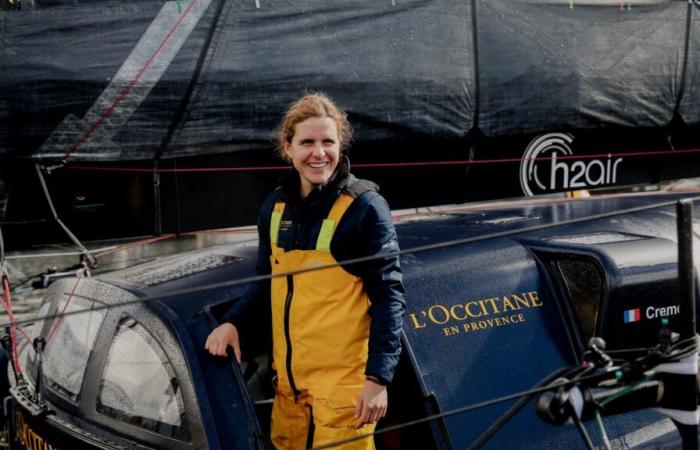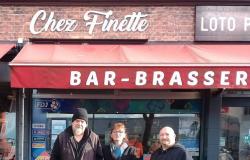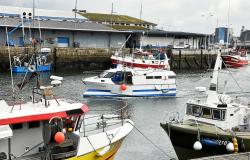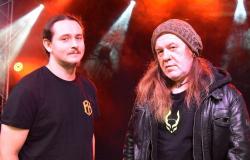
Clarisse Crémer will set off this Sunday for her second Vendée Globe, four years after finishing 12th, and first woman. Since then, the 34-year-old sailor has had a daughter, Mathilda, born in 2022 from her union with skipper Tanguy Le Turquais, also at the start this Sunday. In a long interview with RMC Sport, she talks about motherhood, her objectives and the two controversies which marred her journey between these two Vendée Globes.
Clarisse, what has changed since your first major sailing, the mini-transat in 2017?
At the same time, everything and nothing. It’s true that it was my first solo transatlantic. Now deckchairs are almost workouts. It’s true that sometimes we need to “prick ourselves” a little. It’s not that we become jaded, but in fact, humans get used to everything. For me, I realize that someone who does the Vendée Globe, I no longer find that extraordinary. Whereas at the time, if someone had spoken to me about the Vendée Globe, I would have made a funny face and said to myself ‘wow, those who do that are completely crazy’. But the springs that push me to go on the water are always the same. And what I’m going to look for, what fascinates me about the means of transport, about everything we learn on land, has not changed. If one day I no longer feel this way, I will stop. I’m not the type to say I’m going to do this my whole life. I need to feel a bit of that “wow” side to want to go there.
You like being alone at sea. Is that still the case knowing that you are now a mother?
Motherhood adds an element of complexity. Because before, I wasn’t ashamed to say that I was becoming selfish on the water. That is to say, I thought that people on land, in order to feel good on the water, you had to forget them a little. You should not compare it to the life you could live on earth, to the comfort you could have. It’s something you put aside. That’s also what makes you feel good at sea. And so, when you have a little girl, you still have responsibilities on land that you leave behind. And that adds a little more spice to the equation, because it’s more difficult to cope, to be selfish towards your two-year-old granddaughter. And there are times when you can’t do it, you think about her, and potentially you can worry a little.
Tanguy Le Turquais, your companion, will also be in the race. How are you going to organize yourself at home?
Yes, we both have the difficulty of leaving. We are still well surrounded, we have enough stability to take care of her. It’s my sister-in-law Léna, Tanguy’s little sister who has lived with us for a year and a half, who will look after her. She is also in the Tanguy technical team. That was good, she was at a bit of a crossroads professionally. She learned a job in Tanguy’s team and she made “Super Tati”. It’s Tati Lena, who became Tatina, who is now called Tina. So (laughs). The only thing that really worries me is if something bad happens to him. There, I will probably have a real emotional and psychological problem to manage by perhaps being in the middle of the Pacific without being able to return to land quickly. But I was quite surprised on the four deckchairs that I made: yes, I miss her, I want to see her, but I am not worried about her. But it is certain that we are quite far from the selfishness required to live well at sea.
How will you communicate with her?
We thought about it, but it’s not easy, because she will be two years old right after leaving. So she is still very small. We tell ourselves that we will try to give him some news. And in fact, it is Léna who will have the task of seeing what she prefers or not. We are creating a little notebook where she can have photos of us. We’re going to become his evening story book a bit to explain to him that we’re at sea, all that… We don’t claim to have the recipe at all. But what’s important is her, not us. Just because I want to see her on FaceTime doesn’t mean I’m going to see her on FaceTime. If it doesn’t make her feel good or if it seems like she’s reacting badly, I’ll deal with it another way.
What remains of the episode with Team Banque Populaire and this question of motherhood which caused the separation? Is it digested?
It’s like any challenge in life. There are so many components to this story that I was not able to sit around a table with all the stakeholders to draw some kind of conclusion. No, it’s not perfectly digested. Because what’s more, I think there are still things to do in the world of sailing regarding the subject of motherhood. But it’s still behind me in the sense that I’ve moved forward, I’ve learned. I’m finally very lucky to be on the start line of the Vendée Globe again. To have also met people at L’Occitane (its new partner, Editor’s note) with whom I am perhaps more aligned in terms of beliefs and convictions. I only know how to be transparent, so no it’s not perfectly digested. But it’s something that’s part of my past. I am focused on something else.
Will there be a possibility of reaching this conclusion one day around a table?
No, I don’t think so. There are too many offended individuals and quite violent things that could have been said or done. So, I don’t think it’s possible. It’s true that I’m not at all someone who likes conflict. Despite myself, I found myself in something that was beyond me. Afterwards, I don’t regret anything because that’s what I think and I said it.
The consequence is that you migrated a little towards England since your boat was in Alex Thomson’s stable before arriving in Les Sables. What are the advantages and disadvantages?
We did a big sailing trip together for 3-4 days in the spring. It was nice being with Alex. He was a bit in cool mode. He rode his hump on the Imoca. But it’s a bit of a hybrid project. It’s far from being a copy and paste of the Hugo Boss method since the sponsor is different, the team is different, the skipper is different. We have the tenors of Alex’s team at the management level but otherwise a large part of the technical team is new. There was still a little sense of urgency in the project. But despite everything, it’s super funny to be confronted with Portsmouth in another place. Because we no longer even realize, when we are in Lorient, that we are in a somewhat restricted ecosystem, because that is all we know. It changes perspectives, so it’s great in many aspects. There are also negative points, I will not hide it. Having my boat on the other side of the Channel is not the most practical thing in the world. But again, my project might not have existed at all. And I think I will come away really enriched from this experience. One more.
This shortened preparation allows us to have what objectives for the race?
A challenging and realistic objective is the Top 10. But it’s complicated to give a number because I have a great boat, but we have made very little progress compared to other boats of the same generation. . So, it retains its qualities and its faults a little. It is a war machine “upwind”, in medium and light winds, but much more complicated “downwind”. I’ll make do with what I have. We tried to draw sails which made it a little easier and then I tried to create benchmarks for myself. I have a great boat and at the same time, in the meantime, there have been 13 new boats. And it’s amazing how many people say they’re in it to win.
If you haven’t quite digested what happened with People’s Bank what about the anonymous denunciations accusing you of cheating with Tanguy during the last Vendée Globe for which you were cleared by an international jury?
In your opinion? This is yet another subject which touches on darker springs of the human soul. It was a difficult period which took a lot of energy, which cost me a lot. Digest, I don’t know if that’s the right word, I moved on to something else. I have the chance to do the Vendée Globe and honestly, I am focused on that. From there to telling myself that I understood all the cogs of what had happened, and to validate what happened, that’s a big word. In “digesting”, there is this notion of acceptance, and it’s true that I still have a little trouble. I was really quite beat up before the departure of the two spring deckchairs. It was a difficult time. But even when it’s hard at sea, it’s still my medicine and it helps me get out of things I can’t control. Media, political stuff, I don’t know what, which aren’t really the reason why I love this job.





